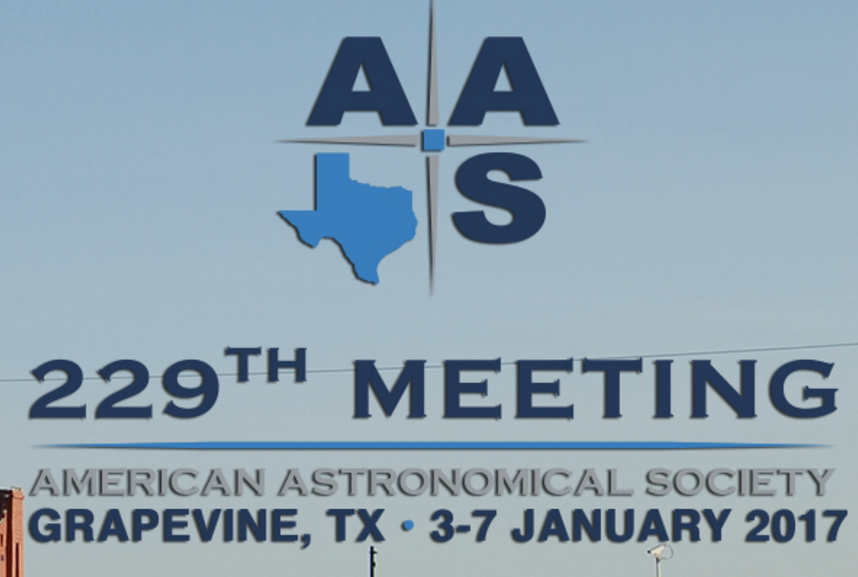- Notes:-
- G.Jogesh Babu is a Professor of Statistics and Professor of Astronomy and Astrophysics at the Penn State University. He is the Director of Center for Astrostatistics. He received a 2016 Outstanding Contributions to Astrostatistics Award from IAA. Jogesh Babu is the Program Chair of the 2016-17 SAMSI Program on Statistical, Mathematical and Computational Methods for Astronomy (ASTRO) August 2016 - May 2017.
10:10 am: Jessi Cisewski (Yale University, New Haven, CT)
Statistical Methods for Characterizing Variability in Stellar Spectra.
Recent years have seen a proliferation in the number of exoplanets discovered. One technique for uncovering exoplanets relies on the detection of subtle shifts in the stellar spectra due to the Doppler effect caused by an orbiting object. However, stellar activity can cause distortions in the spectra that mimic the imprint of an orbiting exoplanet. The collection of stellar spectra potentially contains more information than is traditionally used for estimating its radial velocity curve. I will discuss some statistical methods that can be used for characterizing the sources of variability in the spectra. Statistical assessment of stellar spectra is a focus of the Statistical and Applied Mathematical Sciences Institute (SAMSI)'s yearlong program on Statistical, Mathematical and Computational Methods for Astronomy's Working Group IV (Astrophysical Populations).
- Presentation slides [.pdf]
- Notes:-
- Jessi Cisewski is an Assistant Professor at the Department of Statistics at Yale University, and is leading the Astrostatistics Interest Group at the American Statistical Association with David van Dyk and Thomas Lee. She is the leading statistician of the Astro Working Group IV: Astrophysical Populations (AP) at SAMSI 2016-17 ASTRO Program with Eric Ford.
10:35 am: Jeff Jewell (JPL)
Statistics, Computation, and Modeling in Cosmology
Current and future ground and space based missions are designed to not only detect, but map out with increasing precision, details of the universe in its infancy to the present-day. As a result we are faced with the challenge of analyzing and interpreting observations from a wide variety of instruments to form a coherent view of the universe. Finding solutions to a broad range of challenging inference problems in cosmology is one of the goals of the ~Statistics, Computation, and Modeling in Cosmology~ workings groups, formed as part of the year long program on ~Statistical, Mathematical, and Computational Methods for Astronomy~, hosted by the Statistical and Applied Mathematical Sciences Institute (SAMSI), a National Science Foundation funded institute. Two application areas have emerged for focused development in the cosmology working group involving advanced algorithmic implementations of exact Bayesian inference for the Cosmic Microwave Background, and statistical modeling of galaxy formation. The former includes study and development of advanced Markov Chain Monte Carlo algorithms designed to confront challenging inference problems including inference for spatial Gaussian random fields in the presence of sources of galactic emission (an example of a source separation problem). Extending these methods to future redshift survey data probing the nonlinear regime of large scale structure formation is also included in the working group activities. In addition, the working group is also focused on the study of ~Galacticus~, a galaxy formation model applied to dark matter-only cosmological N-body simulations operating on time-dependent halo merger trees. The working group is interested in calibrating the Galacticus model to match statistics of galaxy survey observations; specifically stellar mass functions, luminosity functions, and color-color diagrams. The group will use subsampling approaches and fractional factorial designs to statistically and computationally efficiently explore the Galacticus parameter space. The group will also use the Galacticus simulations to study the relationship between the topological and physical structure of the halo merger trees and the properties of the resulting galaxies.
- Presentation slides [TBD]
- Notes:-
- Jeff Jewell is a Senior Researcher in Information Systems and Computer Science at JPL. He is a member of the Science Data Understanding team. He is leading the Astro Working Group V: Statistics, Computation, and Modeling in Cosmology (COSMO) at SAMSI 2016-17 ASTRO Program with Joe Guinness.
11:00 am: Ashish Mahabal (Caltech)
Statistical and Mathematical Methods for Synoptic Time Domain Surveys
Recent advances in detector technology, electronics, data storage, and computation have enabled astronomers to collect larger and larger datasets, and moreover, pose interesting questions to answer with those data. The complexity of the data require the use of novel data science techniques to be used. Identifying interesting mathematical and statistical challenges and working on their solutions is one of the aims of the year-long ~Statistical, Mathematical and Computational Methods for Astronomy (ASTRO)~ program of SAMSI. Of the many working groups that have been formed, one is on Synoptic Time Domain Surveys. Within this we have various subgroups discussing topics such as Designing Statistical Features for Optimal Classification, Scheduling Observations, Incorporating Unstructured Information, Detecting Outliers, Light-curve Decomposition and Interpolation, Domain Adaptation, and also Designing a Data Challenge. We will briefly highlight some of the work going on in these subgroups along with their interconnections, and the plans for the near future. We will also highlight the overlaps with the other SAMSI working groups and also indicate how the wider astronomy community can both participate and benefit from the activities.
- Presentation slides [.pdf]
- Notes:-
- Ashish Mahabal is a Senior Researcher at Caltech's Center for Data Driven Discovery. He is leading the Astro Working Group II: Synoptic Time Domain Surveys (TDA) at the SAMSI 2016-17 ASTRO Program with Jogesh Babu. He is also a co-chair of the LSST Transients and Variable Stars Science Collaboration.
- 2016-dec-11: set up page.
- 2017-jan-04: updated information.
- 2017-jan-09: added slides for Babu, Cisewski, Mahabal
- 2017-jan-04: updated information.
Contacts
Aneta Siemiginowska (asiemiginowska @ cfa . harvard . edu)
changelog
AAS-WGAA/ CHASC/ SAMSI


